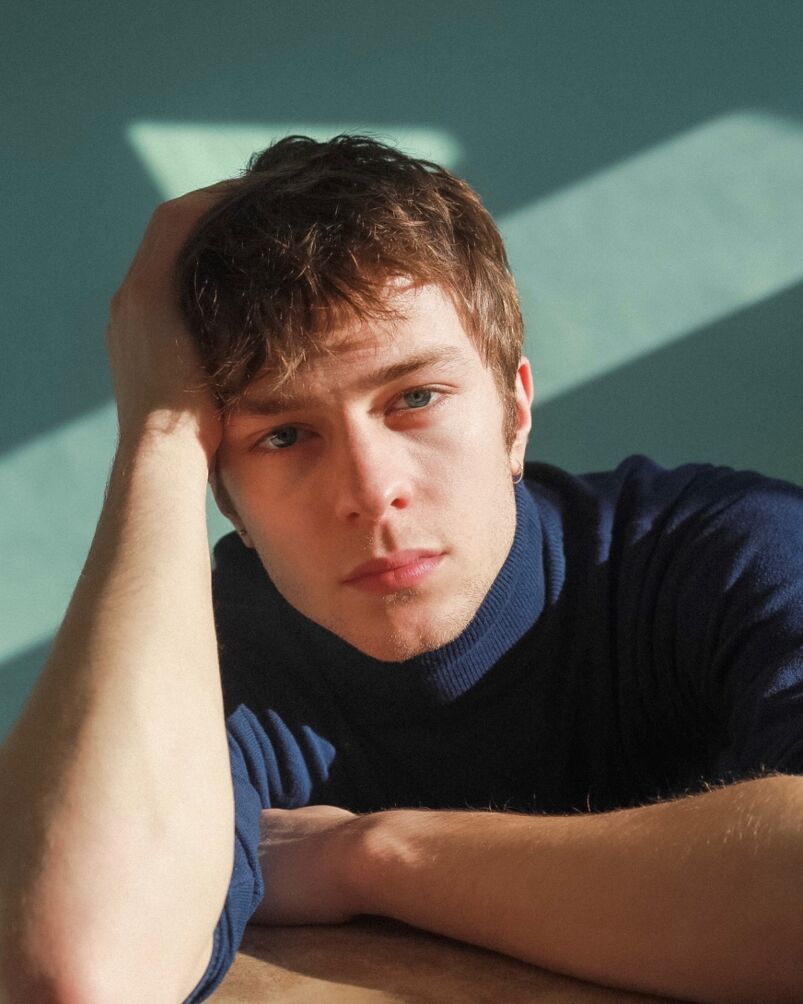
For 40 years now, the Sundance Film Festival has been a platform for independent film, one that brings eyes to stories from all over the globe, with the ability to champion the next generation of filmmakers and actors.
Among this year’s crop was the standout queer sex worker drama Sebastian, a sensual, soul-searching story that is already bringing new eyes to emerging Finnish writer-director Mikko Mäkelä (who previously helmed the 2017 gay romance A Moment In The Reeds) and Ruaridh Mollica, the film’s 24-year-old Scottish-Italian star.
Mollica plays Max, a young hotshot writer with a book deal and a cushy gig at a literary magazine. But, by night, he’s “Sebastian,” a male escort who uses a website to set up appointments with clientele who are frequently older. Sebastian’s sexual exploits become fodder for Max’s writing, but no one in his life—not his editor, his family, or his best friend—knows that Max is actually writing about himself.
Your dose of fabulosi-TEA
Subscribe to our newsletter for your front-row seat to all things entertainment with a sprinkle of everything else queer.
As the lines between fact and fiction blur, Max navigates his sexuality and what he really wants out of life, and Mäkelä’s films probes ideas around identity, authorship, gay shame, and inter-generational differences within our community.
Related:
Sundance 2024 Superlatives: The best, sexiest, funniest, & wildest premieres of the fest
These are the 10 movies from Sundance we’re going to be thinking about all year long.
It’s a highly personal film for both artists, and a brave one—especially for Mollica, who leaves all of himself on screen, physically and emotionally. With a number of high profile projects on the way (including Paramount+’s Sexy Beast TV adaptation and Veep creator Armando Ianucci’s blockbuster satire The Franchise for HBO), the young actor is well aware Sebastian‘s debut is a big moment for him, stepping into his own queerness just as he’s stepping into the spotlight.
Shortly after its Sundance world premiere, Queerty caught up with Mäkelä and Mollica on the ground in Park City to delve into what the film has meant to the both of them. The pair discuss their approach to Sebastian‘s many intimate scenes, how the built trust in one another, and why Mollica’s more ready than ever for the next chapter of his life.
QUEERTY: Mikko, to start, I’m wondering if you can tell us a bit about the genesis of this film—what as the earliest spark of an idea?
MIKKO MÄKELÄ: It was moving into London after university and encountering the queer scene there for the first time. It kind of slowly dawned on me just how many guys were involved in sex work it—you know, more or less casually, more or less openly, more or less professionally. And this was even before OnlyFans as well, and sex work seemed to really be become just another option in the gig economy in London, really. So I was curious about looking at a character for whom sex work is more of a choice, broader than something done for lack of choices.
And then I was also very interested in reflecting on the creative process, and this debate that we continue to have about whether you need to have personal experience in something to be able to write about it, or depict it authentically. You know: Is that necessary? And who has the right to tell whose stories? So I really was looking to kind of craft this almost philosophical inquiry into that question against the backdrop of sex work. Also, [I was] really wanting to make a film that doesn’t problematize sex in any way, where there is no question about the necessity of it, where it is at the heart of the film.
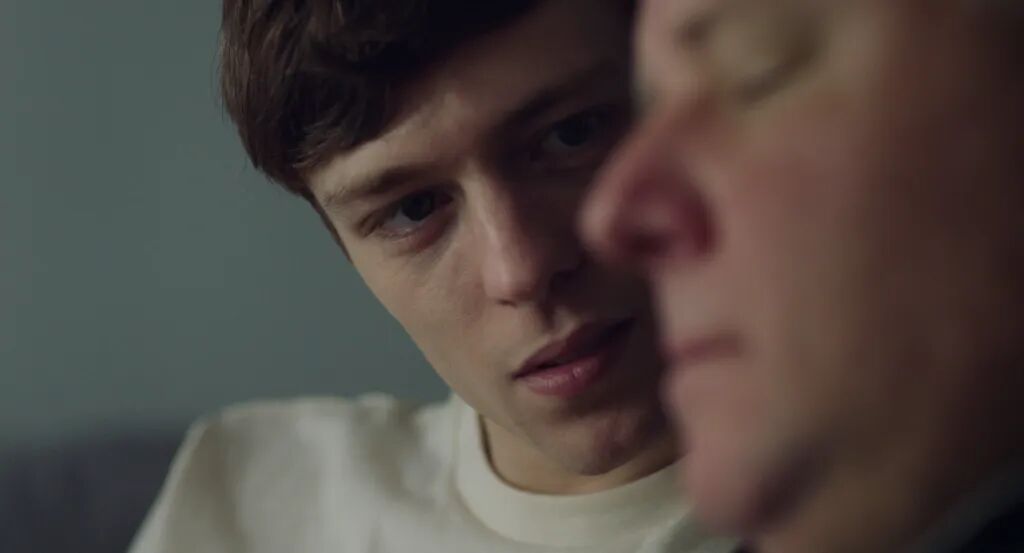
It’s Max’s “day job” that brings up all these questions of authorship, and a bit of commentary on the modern media landscape. Can you tell us a bit about your research into that side of the story, and what you were hoping to capture?
MÄKELÄ: I mean, I’ve been a journalist as well, I used to write for my local paper and thigns like that before I focused more fully on film. But whether it’s a character who’s a writer or a filmmaker or something, it’s [bringing up] some of those same questions pertain.
Right, I can definitely see the parallels you’re making—just as a storyteller.
And just the idea of crafting and making work within the commercial system as well, which definitely as a filmmaker I can relate to those conversations that you have around the development of the work, the financing of the work, the questions you get asked as you’re pitching things and, and, and just navigating the career path of early career artists as well.
I mean, I’ve seen some true horror films at Sundance as well, but some of these moments where Max is speaking with his editor are some of the most tense, bone-chilling scenes of the entire festival
RUARIDH MOLLICA: [Laughs.] Oh god!
So, Ruaridh, to point things to you—speaking of fear—can you tell me about your initial reactions to Sebastian when the project first came your way? Was there apprehension over any aspect of it? Or elements that made you excited?
MOLLICA: Yeah, terrified! Like, from the start. I was already blown away by the initial audition email I got. Like, when you get the brief film description, then you get a bit about the character and who they are, and even just from the way it was written, I could see how considered everything was. And I could tell straight away that this is gonna be a character that has [all] the complexities of a real human—the good and the bad. He’s such a three-dimensional, deep person where, honestly, sometimes portraying the character was so difficult because the drive for something is never just one thing, right? It’s layered. It’s the influence of so many different things and feelings. So it was so exciting and interesting to try and build such a complex person that is not you.
It was it was one of those things where I ended up falling very into the character, and the blurring of everything made it easier, I guess. But, yeah, I was scared for sure. Even in that sense of like, if my performance is bad, it’s every single scene, every single frame. And then the intimate scenes were also scary. Like, that’s gonna be everywhere, that’s gonna be in the world, and people are gonna watch that.
And even in terms of my queerness—a lot of my family and friends know how identify and things like that, but a lot of the don’t! And that’s the that kind of thing that, now that this has been released, it’ll probably bring up that question probably more often.
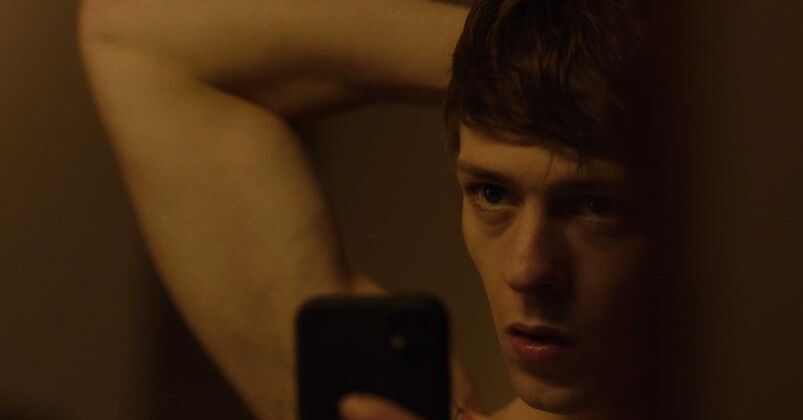
Of course, and that’s a lot of yourself—a lot of trust—to put in the hands of someone else. So what did it take for you and Mäkelä to build that trust? What were some of your earliest conversations like?
MOLLICA: We had a lot of time, actually!
MÄKELÄ: Yeah, because casting happened a year before before shooting, so we had a chance to really have a lot of conversations throughout the year. Around the casting process we were just kind of talking about, first of all, my vision for the project, and kind of filling in any gaps with the character. And then, once we got closer to filming, then we had really detailed, in-depth script analysis—
MOLLICA: Oh my gosh, it was great! Pretty much every week, we’d sit with the script, we’d go through line-by-line, scene-by-scene, and just talking about everything—all the possible things that Max could be feeling, could be going through, just throwing stuff at the wall and seeing what sticks, getting to the real root and the real core of every single scene.
And also, by the end of it, when it came to shoot, we were on exactly the same page. And there were times where, like, I could know what note you were going to give, which was so funny! But it was also great for timing and things because it’s an independent feature, and you have to do things practically.
MÄKELÄ: As a director, I mean, I had entrusted you with the with the role because I believed you’d be able to do it, but there was also such a sense of relief to see how every take was, like, perfect.
MOLLICA: Oh, he’s just being nice. [Laughs.]
MÄKELÄ: But, no, I could always rely on you delivering, even if some of the scenes might have required more takes, or with new people coming in and you’re trying to get the dynamics to work. But, yeah, I could very much rely on Ruaridh delivering.
And, speaking of those “new people” shifting the dynamics, this script really calls for you, Ruaridh, to get pretty close and intimate with a number of other actors—in particular, the great Ingvar Sigurdsson and Jonathan Hyde, who I still remember as the poacher Van Pelt from Jumanji! What sort of work did you have to do with those two to prepare for the sex scenes?
MOLLICA: Yeah, and preparing for that was something that was really important to me, just definitely feeling safe in all of these scenes and knowing what we’re going to be doing. I personally believethat intimacy coordination is one of the most important things that’s come into cinema in recent years. A lot of people disagree, but I think it’s so important in cultivating this safe, trustful bond for these intimate scenes that are really allowed to build something that feels authentic and real without stepping on anyone’s toes.
I just thought it was so incredible that [Rufai Ajala] our intimacy coordinator could make you feel so trusting with someone else in such a short time.
MÄKELÄ: Especially in a film like this. You know, there could be a different case where it’s just two people throughout the film. But because there was [so much more of that here,] each intimacy scene pretty much had a new actor.
MOLLICA: And also each intimate scene was at different parts of what Max was going, ever intimate scene was different in itself—and some not so pleasant. And especially those ones, that was really important to feel really safe with those actors. But they were absolutely incredible; to work with them was such an honor. It was so fun, and I love Jonathan to pieces. He gave his everything, you know? His performance was so soulful.
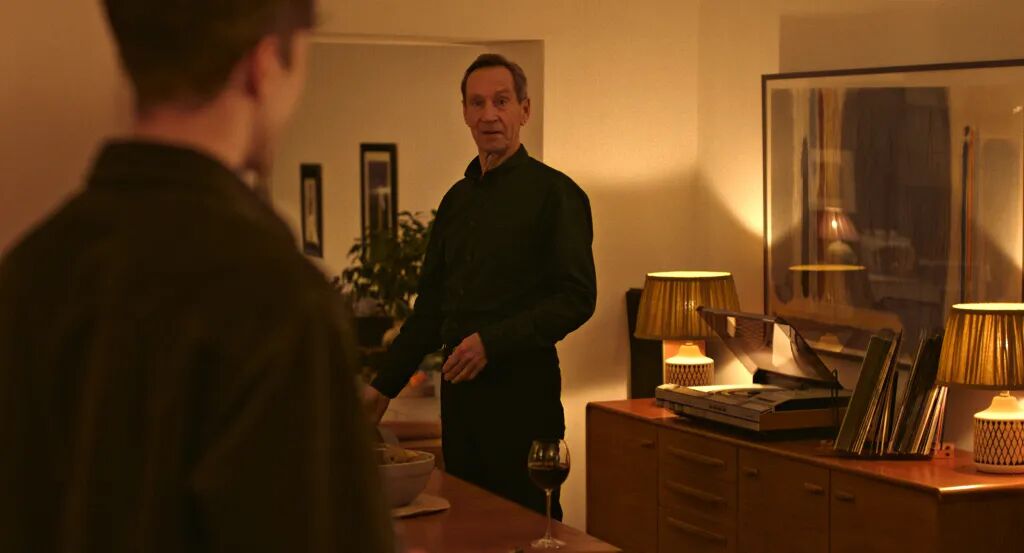
I was going to say, Ruaridh, given that this had been your first major film role, would you say there were any lessons you learned from working with these talented veteran character actors?
MOLLICA: Oh, even just things about acting—what it’s like to be further on in your career. As someone who didn’t go to drama school—it’s something that I’ve just learned job to job, really, through other actors and things like that. To talk to these people who are veterans of the industry and learn how things work for them—also [you] learn that you come up with your own methods, right? Everyone who I’ve met who’s really talented does the things that work for them and no one else.
I don’t know, I talked [to them] a lot about, as your career goes on, what power do you have over that? How do you stay yourself on the outside of your career? Meet Jonathan, I was like, “that’s exactly what I want to be like”—he’s unapologetically himself, he’s so funny, he’s happy, he’s so comfortable in the environment. And he has fun—and he’s an artist! I loved that, and I really, really look up to him.
Related:
10 NC-17 films with full frontal male nudity and where to stream them
Want to spice up your next “Netflix and chill” night? Boy, we have the list for you!
And, Mikko, I did want to touch back on. the sex scenes, which, as we’ve said, are so crucial to Max’s journey. Writing them is one thing, but I imagine filming is a whole different story—what was your approach, as director? How did you decide, you know, how much to show or not show?
MÄKELÄ: I think you kind of have to be led by the idea of emotion and sensation and touch and feeling that you are in the moment, in some sense. So I didn’t want to really film them so much from the outside, but rather with a very kind of participating camera almost, in a sense, in a very close-up approach. Sometimes, we’d do that with jump-cuts and things, but we were just communicating touch with moving hands and looks and sounds, in a very sensory poetry of bodies.
MOLLICA: And I always feel like [the audience is] experiencing it with Max, you really feel it through his eyes and his lens.
If Sebastian is speaking to this moment where sex work feels much more openly discussed, what do you hope audiences might better understand about the industry after seeing your film?
MÄKELÄ: Right, sex work does continue to be more and more normalized. But I’m just interrogating any kind of lingering stigmas around that, you know? If someone chooses to do sex work, why should it be a problem for anyone? But also we’re just the thinking about the humanity of the clients as well, and wanting to do them justice as well. So often, sex work clients can be depicted as looking pathetic in some sense, or not really giving full understanding to the extremely human needs that people people have, and why they might choose to engage with a sex worker, so I think that’s also an important dimension to it.
Shifting gears, but, to wrap things up I wanted to ask what’s become my favorite question any time I get to talk to queer folks in the industry: What’s the first instance where you can remember recognizing queerness on screen, or a time when LGBTQ+ representation in the movies has really made an impact on you?
MÄKELÄ: Growing up in provincial Finland in the early 2000s and being closeted, one of the few windows for me into the queer community were queer films. Beautiful Thing, for example, that’s a great one. And I watched a lot of coming-of-age stories that I found inspiring and affirming. And then, in terms of queer cinema, Weekend is such a classic that I’ve found inspiring in it’s authentic depiction of things.
MOLLICA: I recently watched Close for the first time, and that broke me—I was in ruins, absolutely. And then Beach Rats is incredible as well.
I think, for me, it’s maybe different because my queerness definitely feels like a journey that I’m still going on. And so, for a long time, I knew that I wasn’t straight, but I still felt like I was, and then it was only when I moved to London and had the ability to be myself that I realized, “Oh actually, no, I like men as well.” And that journey—there was a short film I did called “Too Rough,” and that made me look at my sexuality head on. And the same with Sebastian as well—it made me reflect, and that’s what I think this film is meant to do. From this film, I’m living my true self.


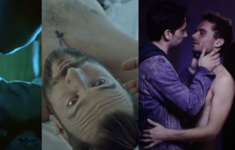


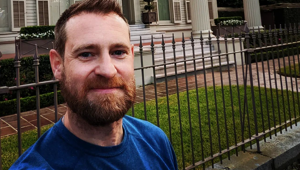
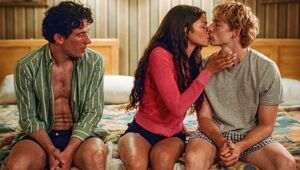














bachy
Very curious to see this film.